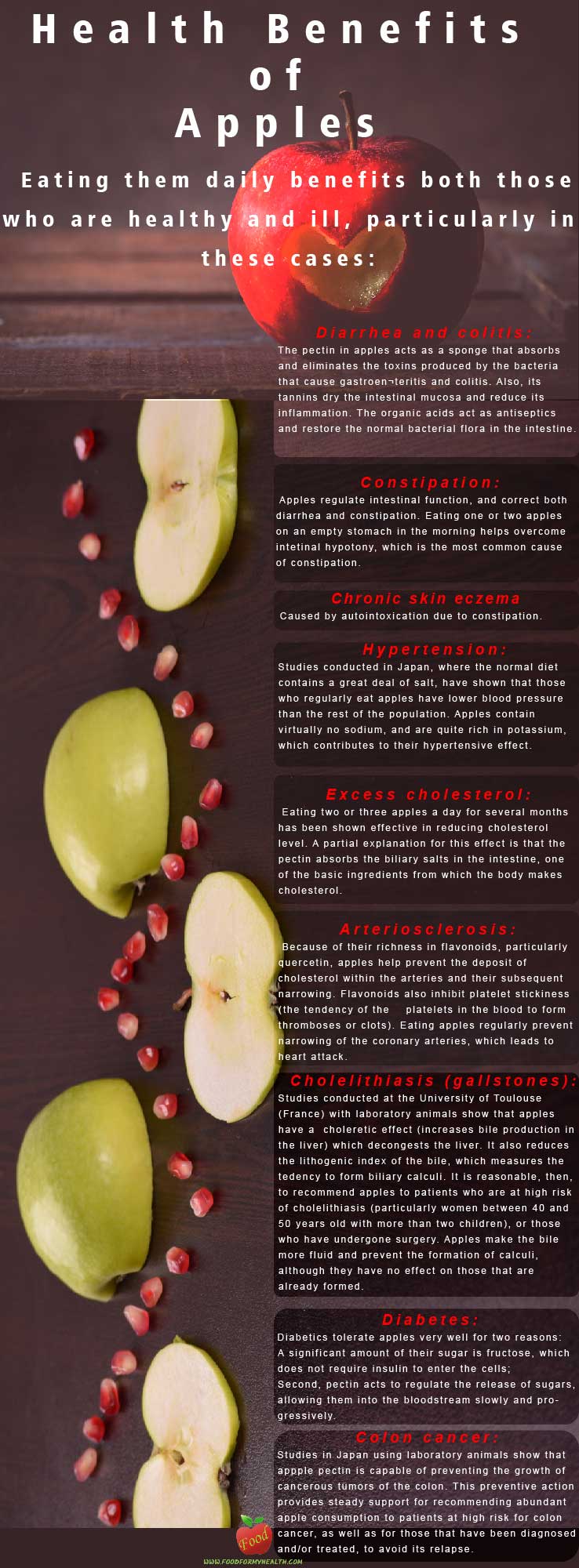Apples
Apples take the fourth place after grapes, oranges, and bananas in world fruit production. Although apples are not the most widely cultivated fruit, they are considered to be the “queen of fruits.” This may be due to the fact of its enormous culinary and medicinal virtues since this fruit practically combines with all other foods.
Apple nutrition facts and health benefits
Apples contain 12.6% carbohydrates in the form of sugars, and aside from that no other nutrient stands out substantially in the apple’s composition. The sugars are primarily fructose (fruit sugar) and lower proportions of glucose and saccharose. Apples contain very small amounts of fats and proteins. Among its vitamins are C and E and its minerals include potassium and iron, although in limited amounts. Nutritional value of apples provides 59 calories per 100 grams (59 kcal/100 g).
Considering this rather ordinary nutritional composition, it is hard to imagine the extraordinary dietary and therapeutic properties that make apple a true medicinal food. Although the apple’s composition by itself does not justify its therapeutic effects, its nonnutritive components do. These components are found in plant-based foods and do not provide energy but their effect is extremely beneficial for our body and health. Nutrition science in recent years is making amazing discoveries of these components in fruits and vegetables and their health benefits. For example, more than 170 phytochemicals have been discovered in the orange, the same applies to apples even though the research is not done thoroughly. These are few of the apple’s nonnutritive components known and their benefits:
Pectin: This hydrocarbon is not absorbed in the intestine, and forms most of what is called insoluble vegetable fiber. Most of the 2.4 g/100 g of fiber in the apple is pectin. Only 1/5 of the fruit’s pectin is in the peel, therefore, when the apple is peeled only a small portion is lost. Pectin retains water and various waste products in the intestine, acting as an intestinal “broom” that facilitates the elimination of toxins with the feces.
Organic acids: These represent 1 % to 1.5% of the apple’s weight, depending on variety. The most prevalent is malic acid, although citric, succinic, lactic, and salicylic acids are also present. As happens with citrus fruits, when these organic acids are metabolized they produce an alkalizing (antacid) effect in the blood and tissues. These acids also renew the intestinal flora and prevent intestinal fermentation.
Tannins: The apple is, after the quince one of the fruits richest in tannins, which is astringent and anti-inflammatory.
Flavonoids: These constitute a group of phytochemicals present in many plant-based foods that are capable of preventing the oxidation of low-density lipoproteins (substances that carry cholesterol in the blood). In this way, flavonoids keep cholesterol from depositing on arterial walls and stop the progress of arteriosclerosis (hardening and narrowing of the arteries). Apples contain a variety of flavonoids, the most active and important of which is quercetin because of its antioxidant effect. Apples are the richest plant-based foods in quercetin.
Boron: This little-known mineral plays a variety of roles within the body that are currently being studied. One of these seems to be facilitating the assimilation of calcium and magnesium, meaning that boron may contribute to the prevention of osteoporosis. Apples are among the fruits richest in boron. These substances partially explain the many medicinal properties of this simple but exceptional fruit: anti-diarrheic, laxative, diuretic, depurant, hypolipidemic (reduces blood lipid levels), choleretic, nerve tonic, alkalizer, and antioxidant. Because of this, eating them daily benefits both those who are healthy and ill, particularly in these cases:
- Diarrhea and colitis: The pectin in apples acts as a sponge that absorbs and eliminates the toxins produced by the bacteria that cause gastroenteritis and colitis. Also, its tannins dry the intestinal mucosa and reduce its The organic acids act as antiseptics and restore the normal bacterial flora in the intestine. A diet based exclusively on apples is effective in any type of diarrhea. When the digestive organs are affected, apples are best prepared as applesauce, baked, or cooked.
- Constipation: Apples regulate intestinal function, and correct both diarrhea and Eating one or two apples on an empty stomach in the morning helps overcome intestinal hypotony, which is the most common cause of constipation.
- Chronic skin eczema caused by autointoxication due to constipation.
- Hypertension: Studies conducted in Japan, where the normal diet contains a great deal of salt, have shown that those who regularly eat apples have lower blood pressure than the rest of the population. Apples contain virtually no sodium, and are quite rich in potassium, which contributes to their hypertensive effect.
- Excess cholesterol: Eating two or three apples a day for several months has been shown effective in reducing cholesterol level. A partial explanation for this effect is that the pectin absorbs the biliary salts in the intestine, one of the basic ingredients from which the body makes cholesterol.
- Arteriosclerosis: Because of their richness in flavonoids, particularly quercetin, apples help prevent the deposit of cholesterol within the arteries and their subsequent narrowing. Flavonoids also inhibit platelet stickiness (the tendency of the platelets in the blood to form thromboses or clots). Eating apples regularly prevent narrowing of the coronary arteries, which leads to heart attack.
- Cholelithiasis (gallstones): Studies conducted at the University of Toulouse (France) with laboratory animals show that apples have a choleretic effect (increases bile production in the liver) which decongests the liver. It also reduces the lithogenic index of the bile, which measures the tendency to form biliary calculi. It is reasonable, then, to recommend apples to patients who are at high risk of cholelithiasis (particularly women between 40 and 50 years old with more than two children), or those who have undergone surgery. Apples make the bile more fluid and prevent the formation of calculi, although they have no effect on those that are already formed.
- Diabetes: Diabetics tolerate apples very well for two reasons:
- A significant amount of their sugar is fructose, which does not require insulin to enter the cells;
- Second, pectin acts to regulate the release of sugars, allowing them into the bloodstream slowly and progressively.
- Colon cancer: Studies in Japan using laboratory animals show that apple pectin is capable of preventing the growth of cancerous tumors of the colon. This preventive action provides steady support for recommending abundant apple consumption to patients at high risk for colon cancer, as well as for those that have been diagnosed and/or treated, to avoid its relapse.

Preparation and Use
Raw: Peeling is recommended because, in spite of what many believe, the small amount of pectin and vitamins in the peel do not favor eating it. The peel can contain pesticides, and it is difficult to digest.
Applesauce: A glass grater is best for this purpose because it is an inert material. However, modern stainless steel is adequate. Applesauce is recommended for children, the elderly, and those weakened by illness.
Baked: This is a delicious and highly digestible way to eat apples.
Cooked: Apples prepared in this way should be eaten with the cooking liquid. These are easy to digest and appropriate for children.
Juice: Natural unprocessed juice is preferable to that prepared industrially.
Treatment
There are medical conditions that can significantly improve with an apple treatment
- Hypertension: Apples facilitate the elimination of the sodium ions that cause the arteries to contract, increase in blood volume, and fluid retention in the tissues. They also replace the sodium ions with those of potassium, which normalize blood pressure and improve cardiac function.
- Gastrointestinal and Colitis-related Diarrhea: Apple fiber (pectin) is a great absorbent that cleanses the intestine. It also restores the physiological bacterial flora acting in combination with the organic acids also found in apples.
- Chronic Eczema Caused by Autointoxication: Apples absorb intestinal toxins, thus facilitating the purification of the blood and the Apples also help relieve constipation and promote purification of the liver, whose congestion results in many skin disorders.
- Liver Disease: Apples decongest the hepatic gland thanks to their choleretic and depurant effects. They are highly recommended in cases of chronic hepatitis, fatty degeneration of the liver due to the consumption of alcoholic beverages, and
- Excess Uric Acid: An apple treatment alkalizes the blood and facilitates the elimination of uric acid through the urine.
- High Cholesterol and Arteriosclerosis: Apples reduce the blood cholesterol level and prevent
- Colon Cancer: Apples help avoid the cancerous degeneration of the colon.
A treatment with apples is done by eating two kilos of apples a day for 3 to 5 consecutive days. Water may be drunk. The apples may be eaten raw, as applesauce, baited, or cooked but without additional sweeteners. This treatment may be repeated several times a year.

Diarrhea and Apple Juice
There have been cases of diarrhea, particularly in children, because of drinking commercially bottled apple juice.
Curiously, this only happens with the bottled clear, transparent juice, and not with natural juice that is cloudy in appearance.
Investigations conducted in the Netherlands have shown that during the industrial process used to clarify the juice certain non-absorbable mono and oligosaccharides are produced. These carbohydrates, together with an excess of fructose in relation to glucose, and the presence of sorbitol, explain the diarrhea that can result from drinking industrial apple juice.
Energy and nutrition value
Energy and nutrition value are for 100 g.
| Nutrient | Unit | Value per 100 g |
|---|---|---|
| Water | g | 85.56 |
| Energy | kcal | 52 |
| Protein | g | 0.26 |
| Total lipid (fat) | g | 0,17 |
| Carbohydrate, by difference | g | 13.81 |
| Fiber, total dietary | g | 2.4 |
| Sugars, total | g | 2,40 |
| Calcium, Ca | mg | 6 |
| Iron, Fe | mg | 0,12 |
| Magnesium, Mg | mg | 5 |
| Phosphorus, P | mg | 11 |
| Potassium, K | mg | 107 |
| Sodium, Na | mg | 1 |
| Zinc, Zn | mg | 0.04 |
| Vitamin C, total ascorbic acid | mg | 4.6 |
| Thiamin | mg | 0,017 |
| Riboflavin | mg | 0,026 |
| Niacin | mg | 0,091 |
| Vitamin B-6 | mg | 0,041 |
| Folate, DFE | µg | 3 |
| Vitamin B-12 | µg | 107,00 |
| Vitamin A, RAE | µg | 3 |
| Vitamin A, IU | IU | 54 |
| Vitamin E (alpha-tocopherol) | µg | 0.0 |
| Vitamin D (D2 + D3) | mg | 0,12 |
| Vitamin D | IU | 0 |
| Vitamin K (phylloquinone) | µg | 2.2 |
| Fatty acids, total saturated | g | 0,028 |
| Fatty acids, total monounsaturated | g | 0,07 |
| Fatty acids, total polyunsaturated | g | 0,051 |
| Fatty acids, total trans | g | 0,000 |
| Cholesterol | 0 | 0,000 |
| Caffeine | 0 | 0,000 |
*Source National Nutrient Database for Standard Reference Release 28


